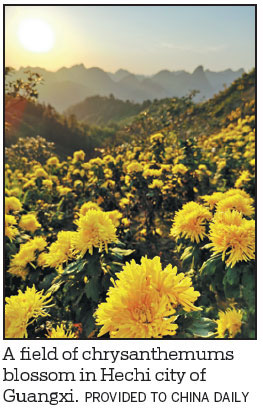Agricultural projects help people to prosper
The vast sea of chrysanthemums at Dashapo poverty alleviation industrial park in the Huanjiang Maonan autonomous county in Hechi of Guangxi Zhuang autonomous region is shining splendidly in a shaft of morning sunlight.
With the arrival of the harvest season, a large number of visitors flock to the park while local villagers are busy picking the flowers to be sent to market.
Dashapo poverty alleviation industrial park, with a total planned investment of 300 million yuan ($42.7 million), mainly focuses on the planting of tea trees, from which tea tree oil is extracted. Currently, more than 800 hectares of tea trees have been cultivated in the industrial park, and people from 18,000 impoverished households are employed there.
It takes five to six years for tea trees to produce the oil.
Chrysanthemums used for medicinal purposes can be planted next to the tea trees, providing a significant economic benefit in a relatively short time, said Wei Lidian, director of Muben Oil Plants Industry Development Center.
Chrysanthemums at the industrial park now cover 147.3 hectares. The total output value can reach 7.09 million yuan, according to Wei.
As the industrial park starts to reap economic returns, households will receive up to 1,500 yuan in support funds. Meanwhile, an industrial poverty alleviation and development fund will be established to support special households that have been lifted out of poverty, Wei said.
The industrial park is one example of Hechi's efforts in alleviating poverty. Over the years, the city has launched a series of important measures and has seen many good results.
Hechi has built more education infrastructure, investing 1.25 billion yuan into various school building and renovation projects.
The city has also improved its medical services and expanded medical insurance coverage to cover all registered impoverished households.
Ninety percent of hospitalization costs at designated hospitals are reimbursed by the government for these households for standard care, and 80 percent of costs on special chronic diseases at outpatient clinics are reimbursed.
Hechi has also improved housing security by renovating 40,600 households that were in poor condition. Drinking water has been improved in rural areas, benefiting 141,800 people.
Developing industries and improving peoples' incomes in rural areas is Hechi's main goal in tackling poverty.
So far, fields of walnut plants and a walnut planting demonstration area were established, the largest of its kind in South China. There are also 60,000 hectares of mulberries, ranking first in China for 14 years in a row. The number of beef cattle and sheep raised in Hechi also ranks top in the whole region.
The annual per capita income of people in rural villages of Hechi is expected to increase by more than 5,000 yuan by 2020, according to local authorities.

Copyright © Hechi Municipal People's Government. All rights reserved.
Presented by China Daily.
京ICP备13028878号-6






